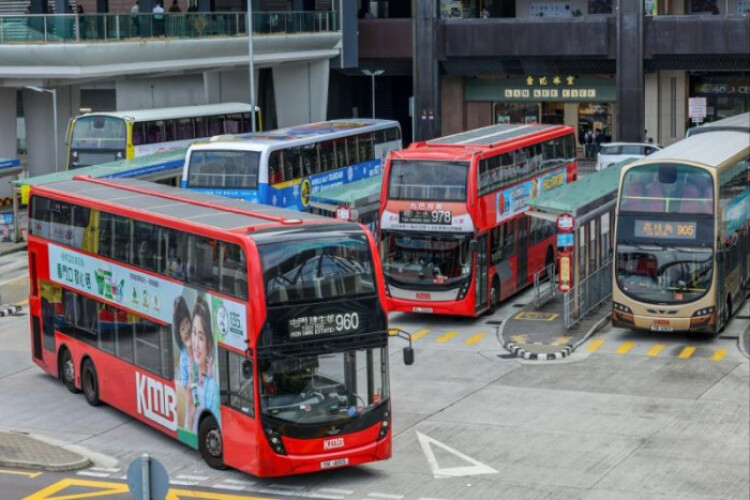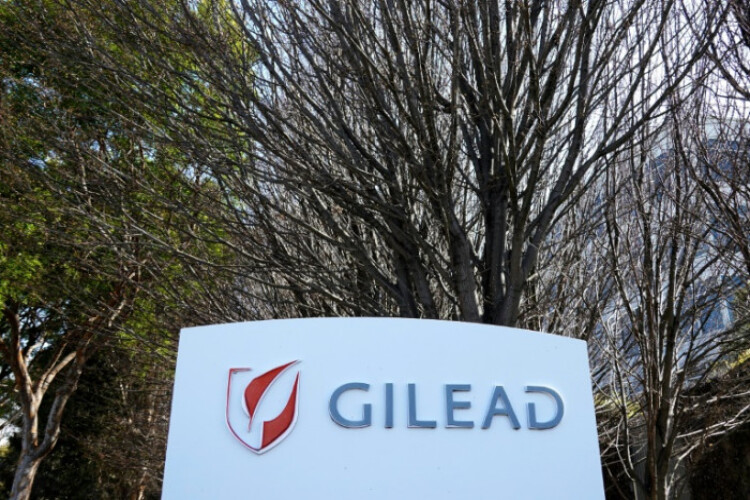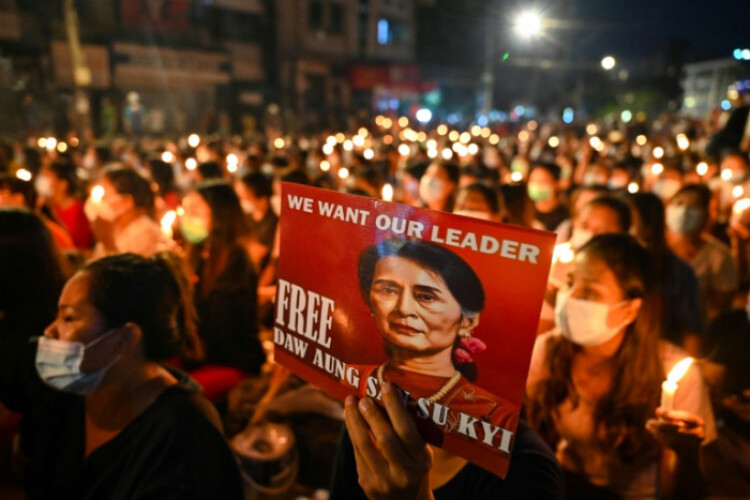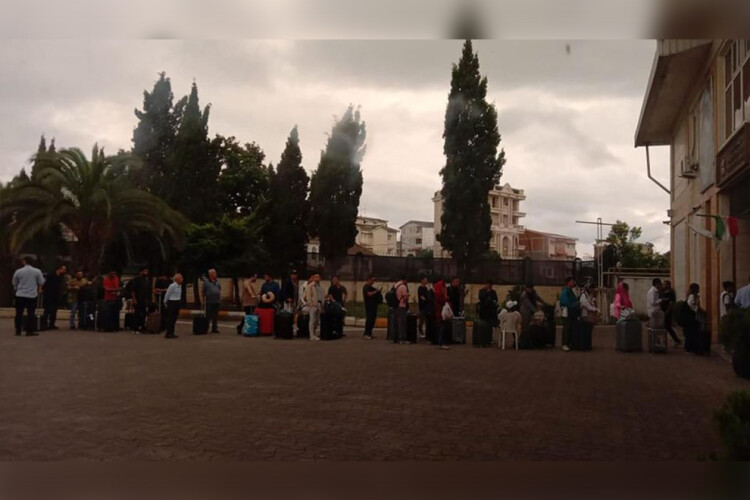
Hong Kong authorities will dish out more than HK$600 million (2.6 billion baht) to help franchised bus companies and the taxi industry procure electric vehicles (EVs) under a plan to achieve zero vehicular emissions and carbon neutrality by 2050.
Secretary for Environment and Ecology Tse Chin-wan announced a road map on Tuesday to gradually replace diesel buses and taxis with electric vehicles, which included a subsidy scheme and plans to substantially increase the number of charging stations.
The road map was due to be delivered in the first half of the year, as promised in the 2023 policy address. But Tse said it was delayed due to "limited choices of electric vehicles on the market half a year ago".
"To incentivise taxi owners to switch to EVs, we need to ensure sufficient choices on the market, so we spent some time talking to the suppliers and introducing new models to Hong Kong, some of which were tailor-made for us," he said.
"Over the past year, we also saw the prices of EVs declining rapidly, so we believe this is a good time to push for the green transformation of buses and taxis."
Under the subsidy scheme, which will be rolled out this month, the government aimed to help operators purchase 600 e-buses and 3,000 e-taxis.
The total subsidy amount would be HK$470 million for the bus trade and HK$135 million for the taxi sector. Invitations for the subsidy scheme will be sent to operators and taxi owners this month.
Currently only 1.4% of the city's 6,000 franchised buses and 0.5% of the 18,000 taxis are electrically powered.
Tse added the government would take a "carrot, but no stick" approach by providing incentives for the trades, instead of making the shift to EVs mandatory. But he noted the prices of EVs were declining rapidly and no further subsidies were necessary in the foreseeable future.
The government also hoped to avoid passing on additional costs to passengers "as far as practicable", the minister said.
He said the recycling of EV batteries locally would pose "no problem" as authorities were building the city's first dedicated plant in Tuen Mun. The facility was scheduled to begin operating in 2026.
Acting deputy environment secretary Ron Yang Rong said the government felt providing subsidies to bus operators was necessary as the price of e-buses was still 50% higher than diesel ones.
The subsidy amount for single-and double-decker buses would be HK$400,000 and HK$800,000 respectively, or 25% of the capital cost, whichever is lower.
Each taxi owner will receive HK$45,000 to procure an e-taxi, which is equivalent to 10% to 25% of the current market price. Owners of the city's 3,000 oldest taxis, or those aged more than 12 years, will have priority.
Authorities aimed to have about 700 e-buses and 3,000 e-taxis introduced by the end of 2027.
Asked why hydrogen vehicles were excluded from the road map, Tse said the development of the technology was still in a preliminary phase, but authorities would continue to observe prices and market acceptance.
The government also laid out plans to increase the number of fast charging stations for EVs, including installing facilities at conventional petrol stations and taxi ranks. Existing charging facilities at bus depots will also be opened up to taxis.
Authorities said they expected to provide at least 500 extra charging facilities by the end of 2027, and 3,000 by 2030.
Franchised bus operators will be responsible for arranging charging facilities at their own expense.
Hong Kong Taxi and Public Light Bus Association chairman Chau Kwok-keung said it welcomed the subsidies but found the amount for the trade "unfair and disproportionate" when compared with bus operators.
He also said he wished the government had consulted the taxi sector earlier to have a deeper understanding of its concerns.
"Many taxi owners are concerned about the heavy burden of replacing the battery, which may last about four to five years but cost HK$60,000 to HK$100,000," he said.
"It's also not as easy for us to find replacement components for EVs."
He also doubted whether the extra 500 fast chargers would be sufficient to support the 3,000 new e-taxis by 2027, noting they would need to share with private cars, which were also rapidly growing in number.
Citybus said it planned to purchase 200 e-buses under the subsidy scheme, adding that it pledged to achieve the goal of its fleet being entirely made up of zero-emission vehicles by 2045.
KMB also said it welcomed the subsidy and would "actively consider" purchasing electric buses.
Secretary for Environment and Ecology Tse Chin-wan announced a road map on Tuesday to gradually replace diesel buses and taxis with electric vehicles, which included a subsidy scheme and plans to substantially increase the number of charging stations.
The road map was due to be delivered in the first half of the year, as promised in the 2023 policy address. But Tse said it was delayed due to "limited choices of electric vehicles on the market half a year ago".
"To incentivise taxi owners to switch to EVs, we need to ensure sufficient choices on the market, so we spent some time talking to the suppliers and introducing new models to Hong Kong, some of which were tailor-made for us," he said.
"Over the past year, we also saw the prices of EVs declining rapidly, so we believe this is a good time to push for the green transformation of buses and taxis."
Under the subsidy scheme, which will be rolled out this month, the government aimed to help operators purchase 600 e-buses and 3,000 e-taxis.
The total subsidy amount would be HK$470 million for the bus trade and HK$135 million for the taxi sector. Invitations for the subsidy scheme will be sent to operators and taxi owners this month.
Currently only 1.4% of the city's 6,000 franchised buses and 0.5% of the 18,000 taxis are electrically powered.
Tse added the government would take a "carrot, but no stick" approach by providing incentives for the trades, instead of making the shift to EVs mandatory. But he noted the prices of EVs were declining rapidly and no further subsidies were necessary in the foreseeable future.
The government also hoped to avoid passing on additional costs to passengers "as far as practicable", the minister said.
He said the recycling of EV batteries locally would pose "no problem" as authorities were building the city's first dedicated plant in Tuen Mun. The facility was scheduled to begin operating in 2026.
Acting deputy environment secretary Ron Yang Rong said the government felt providing subsidies to bus operators was necessary as the price of e-buses was still 50% higher than diesel ones.
The subsidy amount for single-and double-decker buses would be HK$400,000 and HK$800,000 respectively, or 25% of the capital cost, whichever is lower.
Each taxi owner will receive HK$45,000 to procure an e-taxi, which is equivalent to 10% to 25% of the current market price. Owners of the city's 3,000 oldest taxis, or those aged more than 12 years, will have priority.
Authorities aimed to have about 700 e-buses and 3,000 e-taxis introduced by the end of 2027.
Asked why hydrogen vehicles were excluded from the road map, Tse said the development of the technology was still in a preliminary phase, but authorities would continue to observe prices and market acceptance.
The government also laid out plans to increase the number of fast charging stations for EVs, including installing facilities at conventional petrol stations and taxi ranks. Existing charging facilities at bus depots will also be opened up to taxis.
Authorities said they expected to provide at least 500 extra charging facilities by the end of 2027, and 3,000 by 2030.
Franchised bus operators will be responsible for arranging charging facilities at their own expense.
Hong Kong Taxi and Public Light Bus Association chairman Chau Kwok-keung said it welcomed the subsidies but found the amount for the trade "unfair and disproportionate" when compared with bus operators.
He also said he wished the government had consulted the taxi sector earlier to have a deeper understanding of its concerns.
"Many taxi owners are concerned about the heavy burden of replacing the battery, which may last about four to five years but cost HK$60,000 to HK$100,000," he said.
"It's also not as easy for us to find replacement components for EVs."
He also doubted whether the extra 500 fast chargers would be sufficient to support the 3,000 new e-taxis by 2027, noting they would need to share with private cars, which were also rapidly growing in number.
Citybus said it planned to purchase 200 e-buses under the subsidy scheme, adding that it pledged to achieve the goal of its fleet being entirely made up of zero-emission vehicles by 2045.
KMB also said it welcomed the subsidy and would "actively consider" purchasing electric buses.










